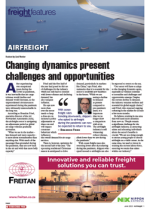After experiencing two exceptional years during the Covid-19 pandemic, it was inevitable that air cargo volumes would decline and demand would decrease, as the unprecedented circumstances experienced during the pandemic were ultimately unsustainable in the long run.According to Brandon Fried, executive director of the Air Forwarders Association (AfA), the airfreight sector is navigating an adjustment period as global air cargo volumes gradually normalise. “What we see in the market – less demand and more capacity – is more about normalisation than anything else. With much of the passenger f leet grounded during the pandemic, they are now back in the air and with that more belly capacity.”Fried said the first half of the year had posed its fair set of challenges for the industry which not only had to contend with lower volumes and declining demand, but also rampant inf lation.He says now more than ever the sector needs to keep a close eye on monetary policy adjustments as these can and will impact consumer behaviour which inf luences the overall demand for air cargo services.There is, however, optimism for the second half of the year. “The upcoming traditional Christmas season is anticipated to drive demand, particularly in markets like China,” says Fried, who maintains that it is essential for the sector to establish new baselines in the future. “While we are seeing a decline in demand at present compared to pre-pandemic years, it is important that we no longer draw a comparison w ith 2019. The airfreight industry is still witnessing robust volumes, albeit lower than we saw during the pandemic.”With ocean freight rates also returning lower after skyrocketing during the pandemic, shippers who opted instead to airfreight can also be expected to return to the sea.“Our sector will have to adapt to the changing dynamics again, especially as volumes continue to normalise and challenges and opportunities emerge. Despite the current decline in demand, the industry remains resilient and essential for global supply chains,” said Fried, who expected ongoing softening in the market for at least a few more months.He believes training is one area that will need more attention from now on. “People remain a significant challenge for the airfreight industry, as attracting talent and educating individuals about the sector’s benefits is crucial. “We are not doing enough to attract young people to choose airfreight as a viable career. At the same time, we need to invest in training the current labour force, ensuring we retain that talent within our industry.”

